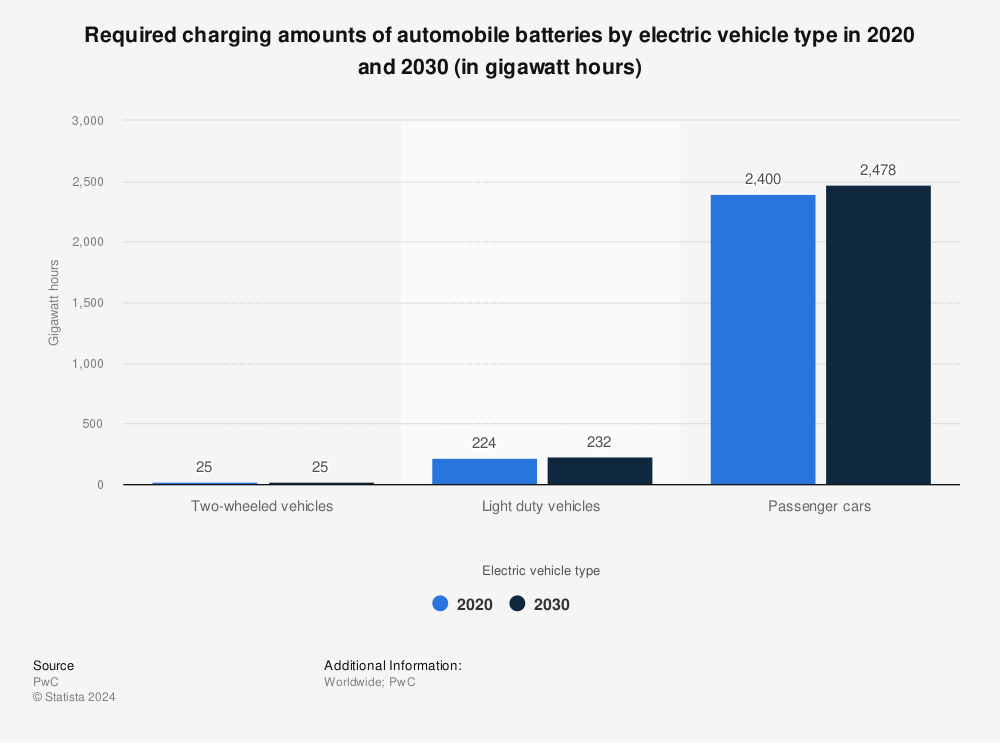In 2016, the Global Electric Vehicle Charging Market was valued at an estimated $1.16 billion US dollars. By the year 2022, this market is expected to reach a value of $12.61 billion US dollars, a substantial compound annual growth rate of 29.8 percent over the forecasted time period. The increased demand for electric vehicles in the coming years will largely fuel the growth of this market during the forecasted tie period.
There has been a huge increase in the demand for electric vehicles in recent years. This has led to the need for stations that can charge electric vehicles. There are two main types of electric vehicle charging stations: AC and DC. AC charging stations provide currents to the on-board vehicle charger and usually offers between 5 and 15 miles of electric range for every 30 minutes of charging. DC charging stations supply current directly to the batteries of electric vehicles an offers about 80 miles of electric range per 30 minutes of charging. AC charging stations are the most commonly used type of charging station, due to their cost effectiveness and their convenience.
Factors Fueling the Growth of the Electric Vehicle Charging Market
There are several factors that are expected to boost the augmentation of the electric vehicle charging market. Of all these factors, however, the increased adoption of electric vehicles on a global scale is expected to fuel the growth of this market substantially. Consumers are becoming more aware of the benefits that these vehicles offer, such as their cost effectiveness, as they do not require fuel, and their environmental friendliness.
Moreover, governments worldwide are pushing to encourage more use of electric vehicles by consumers. As such, they are offering incentive programs, such as grants, tax rebates and subsidies in order to encourage consumers to purchase electric vehicles. As more electric vehicle are purchased, the more charging stations will be needed, which will directly boost the size and value of this market.
Furthermore, more investments in research and development for more efficient electric vehicles, coupled with the projected technological advances, will fuel the growth of the global electric vehicle charging market in the coming years.

Find more statistics at Statista
Global Electric Vehicle Charging Market: Type Segmentation
The global electric vehicle charging market is segmented by the type of chargers that are available. Currently, there are two types of chargers:
- Alternating current (AC)
- Direct current (DC)
AC chargers utilize AC current, which is typically available in the home, in order to charge electric vehicles. AC chargers can be further segmented into three different types:
- Type 1 (up to 3.7 kW)
- Type 2 (more than 3.7 kW)
- AC rapid chargers (up to 43 kW)
These chargers are able to charge an electric vehicle in 6 to 8 hours, 3 to 4 hours, or 40 to 50 minutes, respectively.
In 2016, AC charger segment, specifically the rapid charger segment, held the largest share of the global electric vehicle charging market. It is expected that this segment will continue to dominate the market in the coming years, as they are affordable, easy to use, and can rapidly charge electric vehicles.
Global Electric Vehicle Charging Market: Application Segmentation
During the forecasted time period, commercial and residential application segments are projected to see significant growth. However, it should be mentioned that the growth of the commercial segment, which includes chargers at non-residential locations, is expected to see a higher rate of growth than the residential application segment. Furthermore, both governments and automakers are expected to invest a great deal of money into the expansion of the public infrastructure, which will further augment the commercial application segment.
Global Electric Vehicle Charging Market: Regional Segmentation
The global electric vehicle charging market is further segmented according to region. This market comprises the following regions:
- North America
- South America
- Asia Pacific
- Europe
- The Middle East
- Africa
In 2016, Asia Pacific dominated the global electric vehicle charging industry, as it accounted for 50 percent of the revenue share. In recent years, China has seen a significant amount of growth in both electric vehicles and the charging infrastructure that they require. Additionally, Japan has more electric vehicle charging stations than it does petrol stations, which has also lead to the increase of the industry in this region. Moreover, South Korea has announced that it will invest a substantial amount of money in electric vehicle charging infrastructure. It is projected that this region will continue to lead the market during the forecasted time period as a result of all of these factors.
North America is also expected to see significant growth in this global electric vehicle charging market in the coming years. Increased consumer demand for electric vehicles will lead to an increased demand for electric vehicle charging stations. Moreover, the collaboration of key players in this market to provide more charging infrastructure in the United States will also contribute to the growth of this market in this region.
Global Electric Vehicle Charging Market: Competitive Landscape and Key Vendors
The global electric vehicle charging market is highly competitive, as is indicated by the projected compound annual growth rate during the forecasted time period. Key players in this market are consistently working on developing new products in order to increase the gradation of their existing portfolio of products. In order to make strategic growth possible, key vendors tend to collaborate with other vendors in the electric vehicle charging market. For example, in 2016, ChargePoint Inc collaborate with BMW of North America LLC, as well as Volkswagen of America Inc to establish around 100 DC rapid charging stations along the west and east coasts of the United States.
Key vendors in the global vehicle charting market include ABB Group, Elektromotive Limited, AeroVironment Inc, ChargePoint Inc, Chargemaster Plc, Schneider Electric SE, Eaton Corporation, SemaConnect Inc, Siemens AG, ClipperCreek inc, Delphi Automotive LLP, Tesla Motors Inc, Leviton Manufacturing Co and General Electric. There are several other key players that also contribute to this market.
